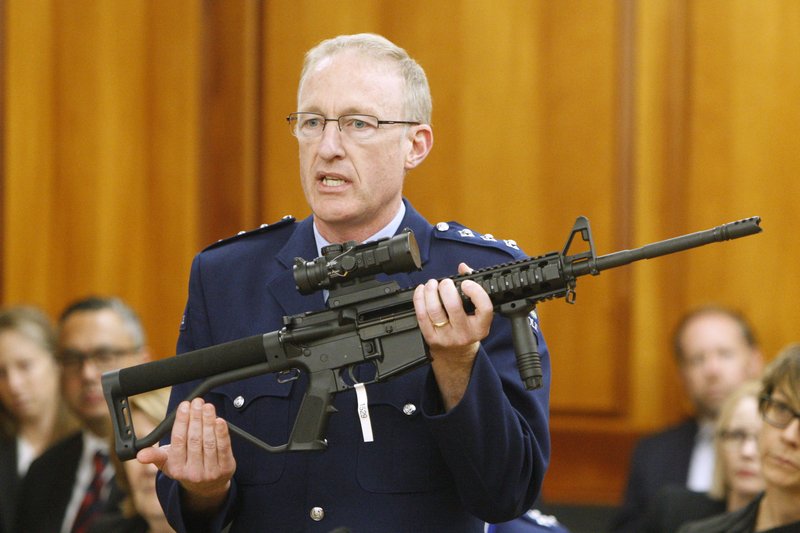WELLINGTON, New Zealand -- New Zealand authorities said Saturday that their country will be a safer place after owners handed in more than 50,000 guns during a buyback program after a ban on assault weapons. But critics say the process was flawed and many owners have illegally stashed their firearms.
Prime Minister Jacinda Ardern had announced a temporary ban just days after a terror attack on two mosques in Christchurch in March that left 51 people dead and was streamed live on Facebook. Weeks later, all but one of Parliament's 120 lawmakers voted to make the ban permanent. It outlaws military-style semi-automatic weapons and assault rifles, and some gun parts. Violators face five years in prison.
A buyback, which began in July, was intended to allow gun owners to sell their weapons without penalty before the ban took effect.
The buyback ended at midnight Friday, with gun collection events staying open late as police reported a surge in last-minute returns.
Provisional figures indicate 33,000 people handed in 51,000 guns and another 5,000 guns as part of a parallel amnesty in which owners could hand over any type of firearm without any questions being asked but without getting compensated.
Owners also modified another 2,700 guns to make them legally compliant, while police said they had seized a further 1,800 guns from gangs since March. And police said they're in the process of collecting another 1,600 guns from gun dealers.
[Video not showing up above? Click here to watch » https://www.youtube.com/watch?v=I_TPHYjhcuo]
Police Minister Stuart Nash told reporters Saturday that criminals would find it harder to get their hands on assault weapons because they tended to steal them from lawful owners, but those weapons would now be out of circulation.
In a statement on Friday, Nash said that the police did not know exactly how many guns there were in the country, complicating efforts to precisely gauge the buyback's success. Nash called for a national register to allow the police to track firearms. Recent police estimates had put the number of total firearms in the country at about 1.2 million.
Starting Saturday, those who owned banned weapons face the risk of prosecution and jail time and losing their firearms license. But gun owners will still be able to voluntarily surrender firearms, with the police retaining discretion of whether to prosecute on a case-by-case basis, Nash's statement said.
The authorities paid out about $66 million, but some gun owners felt that the prices offered were too low, according to local news reports.
The country's largest gun owners group, the Council of Licensed Firearms Owners, called the buyback a "failure" and reiterated its criticism of the new gun-control laws at a news conference last week, calling it "knee-jerk legislation."
Nicole McKee, a spokeswoman for the advocacy group, said owners had kept about two-thirds of the banned weapons because they had lost faith in the government and hadn't been offered adequate compensation.
"They never overcame being blamed by authorities for being somehow responsible for a heinous act of terrorism -- something they would never do," McKee said in a statement.
In a television interview earlier last week, Nash said that he believed that the majority of banned weapons had been handed in.
In making her case for the ban, Ardern had pointed to Australia's success implementing gun-control measures after a mass shooting there in 1996. The country implemented strict new laws and carried out a gun buyback that removed more than 20% of firearms from circulation. Since then, rates of gun violence and gun suicides have tumbled.
In July, Ardern announced a second wave of gun-control measures, including a mandatory gun register and a ban on gun purchases by foreign visitors. She argued that the proposed restrictions would have prevented the mosque attacks.
The group Gun Control NZ supports the creation of a register, arguing that the laws passed earlier this year are a good first step, but that additional measures are needed.
"The very fact that semi-automatic weapons are now prohibited and the buyback took place is a success," Hera Cook, a member of the group and a public health researcher, wrote in The Guardian on Thursday.
Information for this article was contributed by Nick Perry of The Associated Press and by Karen Zraick of The New York Times.
A Section on 12/22/2019

